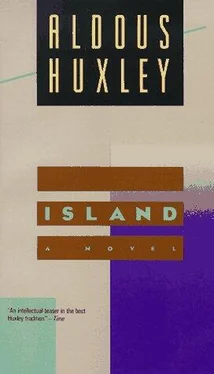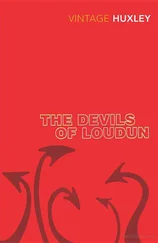Aldous Huxley - Island
Здесь есть возможность читать онлайн «Aldous Huxley - Island» весь текст электронной книги совершенно бесплатно (целиком полную версию без сокращений). В некоторых случаях можно слушать аудио, скачать через торрент в формате fb2 и присутствует краткое содержание. Жанр: Социально-психологическая фантастика, на английском языке. Описание произведения, (предисловие) а так же отзывы посетителей доступны на портале библиотеки ЛибКат.
- Название:Island
- Автор:
- Жанр:
- Год:неизвестен
- ISBN:нет данных
- Рейтинг книги:3 / 5. Голосов: 1
-
Избранное:Добавить в избранное
- Отзывы:
-
Ваша оценка:
- 60
- 1
- 2
- 3
- 4
- 5
Island: краткое содержание, описание и аннотация
Предлагаем к чтению аннотацию, описание, краткое содержание или предисловие (зависит от того, что написал сам автор книги «Island»). Если вы не нашли необходимую информацию о книге — напишите в комментариях, мы постараемся отыскать её.
Island — читать онлайн бесплатно полную книгу (весь текст) целиком
Ниже представлен текст книги, разбитый по страницам. Система сохранения места последней прочитанной страницы, позволяет с удобством читать онлайн бесплатно книгу «Island», без необходимости каждый раз заново искать на чём Вы остановились. Поставьте закладку, и сможете в любой момент перейти на страницу, на которой закончили чтение.
Интервал:
Закладка:
Light here, light now. And because it was infinitely here and timelessly now, there was nobody outside the light to look at the light. The fact was the awareness, the awareness the fact.
From that other world, somewhere out there to the right, came the sound once more of Susila's voice.
"Are you feeling happy?" she asked.
A surge of brighter radiance swept away all those flickering thoughts and memories. There was nothing now except a crystalline transparency of bliss.
Without speaking, without opening his eyes, he smiled and
nodded.
"Eckhart called it God," she went on. " 'Felicity so ravishing, so inconceivably intense that no one can describe it. And in the midst of it God glows and flames without ceasing.' "
God glows and flames ... It was so startlingly, so comically right that Will found himself laughing aloud. "God like a house on fire," he gasped. "God-the-Fourteenth-of-July." And he exploded once more into cosmic laughter.
Behind his closed eyelids an ocean of luminous bliss poured upwards like an inverted cataract. Poured upwards from union into completer union, from impersonality into a yet more absolute transcendence of selfhood.
"God-the-Fourteenth-of-July," he repeated and, from the heart of the cataract, gave vent to a final chuckle of recognition and understanding.
"What about the fifteenth of July?" Susila questioned. "What about the morning after?"
"There isn't any morning after."
She shook her head. "It sounds suspiciously like Nirvana."
"What's wrong with that?"
"Pure Spirit, one hundred percent proof-that's a drink that only the most hardened contemplation guzzlers indulge in. Bo dhisattvas dilute their Nirvana with equal parts of love and work."
"This is better," Will insisted.
"You mean, it's more delicious. That's why it's such an enor mous temptation. The only temptation that God could succumb to. The fruit of the ignorance of good and evil. What heavenly lusciousness, what a supermango! God had been stuffing Him self with it for billions of years. Then all of a sudden, up comes Homo sapiens, out pops the knowledge of good and evil. God had to switch to a much less palatable brand of fruit. You've just eaten a slice of the original supermango, so you can sympathize with Him."
A chair creaked, there was a rustle of skirts, then a series of small busy sounds that he was unable to interpret. What was she doing? He could have answered that question by simply opening his eyes. But who cared, after all, what she might be doing? Nothing was of any importance except this blazing uprush of bliss and understanding.
"Supermango to fruit of knowledge-I'm going to wean you," she said, "by easy stages."
There was a whirring sound. From the shallows, a bubble of recognition reached the surface of consciousness. Susila had been putting a record on the turntable of a phonograph and now the machine was in motion.
"Johann Sebastian Bach," he heard her saying. "The music that's closest to silence, closest, in spite of its being so highly organized, to pure, hundred percent proof Spirit."
The whirring gave place to musical sounds. Another bubble of recognition came shooting up; he was listening to the Fourth Brandenburg Concerto.
It was the same, of course, as the Fourth Brandenburg he had listened to so often in the past-the same and yet completely different. This Allegro-he knew it by heart. Which meant that he was in the best possible position to realize that he had never really heard it before. To begin with, it was no longer he, William Asquith Farnaby, who was hearing it. The Allegro was revealing itself as an element in the great present Event, a manifestation at one remove of the luminous bliss. Or perhaps that was putting it too mildly. In another modality this Allegro was the luminous bliss; it was the knowledgeless understanding of everything apprehended through a particular piece of knowledge; it was undifferentiated awareness broken up into notes and phrases and yet still all-comprehendingly itself. And of course all this belonged to nobody. It was at once in here, out there, and nowhere. The music which, as William Asquith Farnaby, he had heard a hundred times before, he had been reborn as an unowned awareness. Which was why he was now hearing it for the first time. Unowned, the Fourth Brandenburg had an intensity of beauty, a depth of intrinsic meaning, incomparably greater than anything he had ever found in the same music when it was his private property.
"Poor idiot" came up in a bubble of ironic comment. The poor idiot hadn't wanted to take yes for an answer in any field but the aesthetic. And all the time he had been denying, by the mere fact of being himself, all the beauty and meaning he so passionately longed to say yes to. William Asquith Farnaby was nothing but a muddy filter, on the hither side of which human beings, nature, and even his beloved art had emerged bedimmed and bemired, less, other and uglier than themselves. Tonight, for the first time, his awareness of a piece of music was completely unobstructed. Between mind and sound, mind and pattern, mind and significance, there was no longer any babel of biographical irrelevances to drown the music or make a senseless discord. Tonight's Fourth Brandenburg was a pure datum-no, a blessed donum-uncorrupted by the personal history, the secondhand notions, the ingrained stupidities with which, like every self, the poor idiot, who wouldn't (and in art plainly couldn't) take yes for an answer, had overlaid the gifts of immediate experience.
And tonight's Fourth Brandenburg was not merely an unowned Thing in Itself; it was also, in some impossible way, a Present Event with an infinite duration. Or rather (and still more impossibly, seeing that it had three movements and was being played at its usual speed) it was without duration. The metronome presided over each of its phrases; but the sum of its phrases was not a span of seconds and minutes. There was a tempo, but no time. So what was there?
"Eternity," Will was forced to answer. It was one of those metaphysical dirty words which no decent-minded man would dream of pronouncing even to himself, much less in public. "Eternity, my brethren," he said aloud. "Eternity, blah-blah." The sarcasm, as he might have known it would, fell completely flat. Tonight those four syllables were no less concretely significant than the four letters of the other class of tabooed words. He began to laugh.
"What's so funny?" she asked.
"Eternity," he answered. "Believe it or not, it's as real as shit."
"Excellent!" she said approvingly.
He sat there motionlessly attentive, following with ear and inward eye the interwoven streams of sound, the interwoven streams of congruous and equivalent lights, that flowed on time-lessly from one sequence to another. And every phrase of this well-worn familiar music was an unprecedented revelation of beauty that went pouring upwards, like a multitudinous fountain, into another revelation as novel and amazing as itself. Stream within stream-the stream of the solo violin, the streams of the two recorders, the manifold streams of the harpsichord and the little orchestra of assorted strings. Separate, distinct, individual-and yet each of the streams was a function of all the rest, each was itself in virtue of its relationship to the whole of which it was a component.
"Dear God!" he heard himself whispering.
In the timeless sequence of change the recorders were holding a single long-drawn note. A note without upper partials, clear, pellucid, divinely empty. A note (the word came bubbling up) of pure contemplation. And here was another inspirational obscenity that had now acquired a concrete meaning and might be uttered without a sense of shame. Pure contemplation, unconcerned, beyond contingency, outside the context of moral judgments. Through the uprushing lights he caught a glimpse, in memory, of Radha's shining face as she talked of love as contemplation, of Radha once again, sitting cross-legged, in a focused intensity of stillness, at the foot of the bed where Lakshmi lay dying. This long pure note was the meaning of her words, the audible expression of her silence. But, always, flowing through and along with the heavenly emptiness of that contemplative fluting was the rich sound, vibration within passionate vibration, of the violin. And surrounding them both-the notes of contemplative detachment and the notes of passionate involvement- was this network of sharp dry tones plucked from the wires of the harpsichord. Spirit and instinct, action and vision-and around them the web of intellect. They were comprehended by discursive thought, but comprehended, it was obvious, only from the outside, in terms of an order of experience radically different from that which discursive thinking professes to explain.
Читать дальшеИнтервал:
Закладка:
Похожие книги на «Island»
Представляем Вашему вниманию похожие книги на «Island» списком для выбора. Мы отобрали схожую по названию и смыслу литературу в надежде предоставить читателям больше вариантов отыскать новые, интересные, ещё непрочитанные произведения.
Обсуждение, отзывы о книге «Island» и просто собственные мнения читателей. Оставьте ваши комментарии, напишите, что Вы думаете о произведении, его смысле или главных героях. Укажите что конкретно понравилось, а что нет, и почему Вы так считаете.











